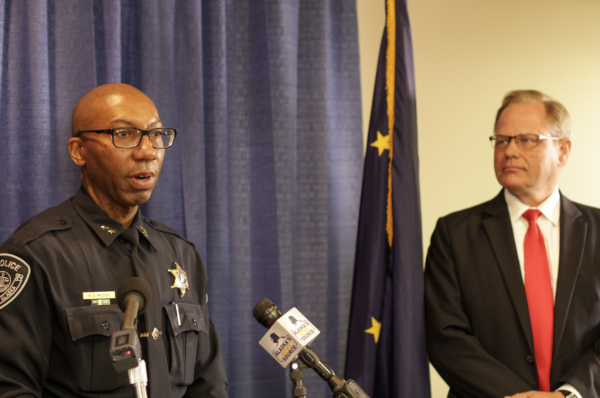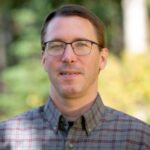
Anchorage now officially has its first Black police chief in the department’s 100-year history.
Chief Kenneth McCoy was sworn in Aug. 4, following his appointment by Mayor Dave Bronson.
In a recent interview, McCoy told Alaska Public Media’s Casey Grove that law enforcement has made progress combating crime in Alaska’s largest city. But, he also says, there are some continuing problems he’d like to see addressed and some ways he thinks the department can refocus.
Listen here:
Kenneth McCoy: I’ve heard from a lot of community members who’ve expressed some level of frustration about crimes that are impacting them directly and their neighborhoods. And so when we refocus on crimes of low-level drugs and crimes of public disorder, we’re looking at those crimes that are impacting neighborhoods. So we get complaints oftentimes about, you know, there’s a certain house in the neighborhood that there’s suspected drug activity at. Those are real concerns for people who live in those communities — for themselves, for their children, for their quality of life. Other crimes of public disorder such as trespassing, vandalism, we get lots of complaints from business owners for us to take more action in those categories. So those are areas that the public would like us to focus on. And I intend to give that some effort to address.
[Sign up for Alaska Public Media’s daily newsletter to get our top stories delivered to your inbox.]
Casey Grove: Some of the focus from folks in the community, including the mayor, has been on homelessness — or at least, you know, activity out on the street. And I just wanted to ask: Some of these lower-level crimes like open panhandling and things like that, are those part of the refocus? And is any part of that related to any directive from the mayor about what you should focus on?
KM: Primarily, my focus has come from conversations with the community and what the concerns are in the community. Regarding the population of people who are experiencing homelessness, I’m committed to working with our partners to ensure that we have the appropriate resources available to assist people in need. So assisting the city with housing plans, working with our partners to ensure that there’s mental health treatment available, substance abuse treatment available. So we’re going to continue to be a good partner to ensure all of that’s available for people in need. If crimes are being committed within that population, we’re going to do our part there also and enforce the law for those violations.
CG: Another thing you said recently about APD investigations going forward is that you’d like to see another focus on non-fatal gun crimes and shootings. And I thought that was really interesting. Could explain that?
KM: Our department is great at responding to major crimes, you know, homicides and robberies. And we respond to those crimes, we bring all the appropriate resources to bear and we have very high clearance rates for our homicides. We do experience quite a few shootings where the victims do not die, where the victims may not be totally cooperative with us when we try to investigate. We get reports of indiscriminate gunfire hitting residences and vehicles. And so what I’d like to see is when we get those calls, that we have a better response, better crime scene processing, utilize more of the technology that’s available to us to investigate those crimes. Because what we know is a small percentage of people are committing these offenses who are shooting throughout the city. And if we investigate these earlier on and make the connections, we’ll most likely apprehend these individuals before they graduate to greater, more major crimes.
CG: I know that we’re still in the process of taking public input on the body-worn cameras. But I’m curious, what do you think that program is going to look like in the end when it’s implemented?
KM: A big part of any body-worn camera program is the policy that governs it. So we have taken some deliberate steps to work with the community, to get their feedback on what that policy is going to look like. And I’m very pleased with the process that we’ve undergone up to this point. We’ve received lots of really good feedback. And what we are doing is trying to incorporate as much of that as possible into the actual policy. We’ve run into some concerns from the legal department regarding privacy laws. So right now we’re working to address those concerns. And once we work our way through that, we’ll be presenting another draft to the community for further comment and feedback.
CG: What do you think the significance to the community is to have the first Black police chief here in Anchorage?
KM: First of all, it’s a very proud moment for me and especially for my family. And this community has really rallied behind me and the police department and shown their support, which is something I’m incredibly grateful for and thankful for this community, what they’ve shown. And so I think this is really an important achievement and important milestone for our entire community.
Casey Grove is host of Alaska News Nightly, a general assignment reporter and an editor at Alaska Public Media. Reach him at cgrove@alaskapublic.org. Read more about Casey here.





